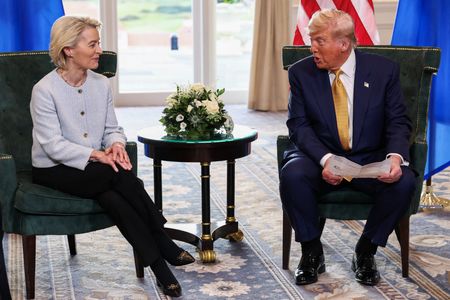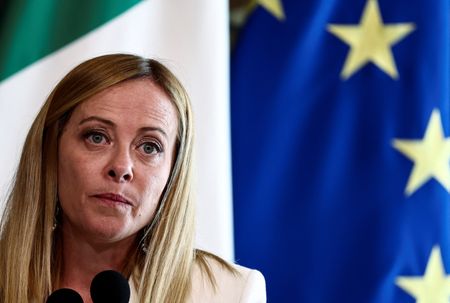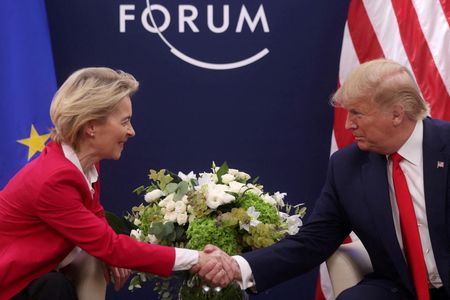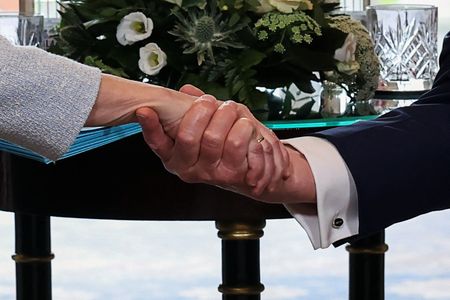TURNBERRY, Scotland (Reuters) -U.S. President Donald Trump on Sunday said the United States and the European Union had reached agreement on a trade deal that includes a 15% tariff on EU goods entering the U.S. and significant EU purchases of U.S. energy and military equipment.
The deal also calls for $600 billion in investments in the U.S. by the EU, he told reporters.
This follows a U.S. deal with Japan on July 23 that cut tariffs on auto imports and other goods in exchange for a $550 billion package of U.S.-bound investment and loans.
Major financial markets were still closed. The euro ended last week around three-week highs at $1.1738, while the STOXX 600 <.STOXX> hit its highest since early June last week as optimism built for a EU-U.S. trading deal.
Following are comments from business leaders and companies, and market reaction to the announcement.
COMMENTS:
HOLGER SCHMIEDING, CHIEF ECONOMIST, BERENBERG BANK, LONDON:
“First the good news: the crippling uncertainty is largely over, the deal is bearable for the EU. Modestly good news for equity markets, that probably priced in most of it beforehand. The deal seems to be largely in line with the reports about a potential deal last Thursday.”
“Trump can claim that the asymmetric deal is a ‘win’ for him. But of course, the outcome is still bad relative to the situation that prevailed before Trump started his trade wars.”
“The U.S. will pay a heavy price for Trump‘s backward-looking protectionism through higher prices for consumers and less trend growth. Together with Trump‘s clampdown on immigration, his protectionism reduces U.S. trend growth from 2% to 1.5%.”
BRIAN JACOBSEN, CHIEF ECONOMIST, ANNEX WEALTH MANAGEMENT, BROOKFIELD, WISCONSIN:
“President Trump said the trade deal with the EU is the biggest of all the deals. Whether it’s imports or exports, Mexico, China, and Canada are bigger deals than the EU. So, this is the biggest deal until the next one.”
“Settling into an average 20% tariff rate is better than the Liberation Day tariff rate of 25%, but it’s still a lot higher than the 2024 tariffs of 2.5%.”
“Tariffs are a stick to make it more expensive to produce outside the U.S. The One Big Beautiful Bill has a number of carrots in it to make it cheaper to produce inside the U.S. It’s a gamble to see if the stick-and-carrot approach to investing in the U.S. will work, especially since sticks tend to hurt right away while carrots take time to show their benefits.”
HASNAIN MALIK, STRATEGY HEAD OF EQUITY RESEARCH, TELLIMER, DUBAI:
“The headline 15% will be a relief for all investors, particularly for those in European manufacturing assets. In common with other ‘deals’, like the one with Japan, the devil will be in the detail, and metals is already one area of confusion, but that is something to worry about later.”
MICHAEL BROWN, SENIOR RESEARCH STRATEGIST, PEPPERSTONE, LONDON:
“The EU is going to be hit with a 15% tariff which is pretty punchy but it’s half of the 30% they were threatened with and it’s well off the 50% that Trump had been throwing around at the start of the month so that’s good news.”
“This is more a case of the risk of no deal being removed as opposed to whether it’s 15%-20%, I’m not entirely sure that matters so much at least not in terms of how markets are going to trade in an hour or so when things get up and running for the week.”
“The two obvious reactions that you would expect are upside in the euro and upside in equity futures. I don’t think equities in particular needed much of an excuse to rally and now they’ve got one.”
ERIC WINOGRAD, CHIEF ECONOMIST, ALLIANCEBERNSTEIN, NEW YORK:
“This is very similar to the deal we reached with Japan.”
“We will need to see how long the sides stick to the deal. From a market perspective, it is reassuring in the sense that having a deal is better than not having a deal.”
RICK MECKLER, PARTNER, CHERRY LANE INVESTMENTS, NEW VERNON, NEW JERSEY:
“It’s really in line with the Japan deal, and I assume investors will view it positively as they viewed the Japan deal. The reality is there will be higher tariffs, which may lead to more inflation, depending on how much of it is absorbed by the manufacturers and how much of it is passed on to consumers.
I think from the administration’s point of view, they probably have begun to address the balance of trade issues. The question remains whether using tariffs as a way to address these imbalances is positive for the global economy or just a tax that helps with jobs here in the U.S.”
(Reporting by Matt Tracy and Caroline Valetkevitch in New York and Lucy Raitano and Karin Strohecker in London; Compiled by Amanda Cooper; Editing by Alexandra Hudson and Marguerita Choy)











